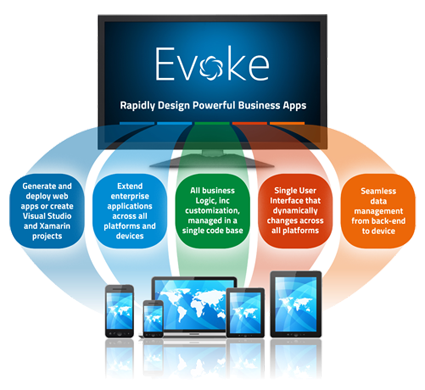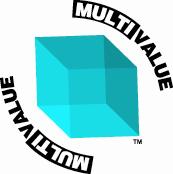
Background
BlueFinity has recently announced a series of new functions to further help support a wider array of MultiValue environments for its highly acclaimed Evoke low-code app development platform. These updates provide access to an extended number of MV databases as well as providing enhanced support for easier integration with MV platforms.
Evoke is renowned for its flexibility in being able to access and manage multiple types of databases, different flavours of SQL, Oracle and DB2 as well as ensuring that this advanced technology is fully integrated with all major MultiValue databases.
For in excess of 15 years BlueFinity has focussed on the development and support of a range of technologies (along with the provision of professional services) that have bridged the cross-over between the .NET and MultiValue environments. This has benefited companies world-wide, allowing them to develop modern .NET based applications whilst accessing, using and updating the wealth of data held on legacy MultiValue databases. As a result, BlueFinity has gained a unique insight and knowledge of both worlds.
The BlueFinity Evoke app development platform is a world-class product built on industry standard principles and technologies (.NET, Visual Studio/Xamarin, SQL, Azure). BlueFinity has developed the product so that, as well as supporting SQL database technologies (including MS SQL and Oracle), it can fully support MultiValue databases, including support for all types of BASIC legacy code. This has resulted in apps that are built using Evoke, on modern technology, being able to work as an integrated element of an existing MultiValue environment.
The difference with MultiValue
But, given that MultiValue is not the same as SQL, what does that mean? The DB structures are very different and the associated code is often diverse and structured in a dissimilar manner. Also, MultiValue databases and coding syntax are frequently, quite different from each other. So, what is BlueFinity doing to truly support MultiValue companies and how does it support such diverse database environments in the MultiValue world?

BlueFinity has focussed on three primary areas to achieve the high levels of integration required to effectively deploy modern apps across multiple mobile and desktop devices that will work seamlessly with MultiValue databases; the integration with the MultiValue database, the regular access to the database and the assimilation and re-use of existing code in to the app.
- MultiValue Data and Databases
Evoke works seamlessly with mv.NET, BlueFinity's own connectivity tool, or alternatively any of the available Rocket connection tools, to provide for the interaction with your specific MultiValue database(s). Evoke will automatically import the data dictionaries from the selected MV database and display the details of the dictionary so that it can be selectively imported into an Evoke App design resulting in data objects, items and attributes being fully accessible by Evoke generated apps.
With Evoke you define your data structures within the design in a way that is most suitable and accessible for your proposed app. Evoke then provides you with the technology to map your Evoke data structure fields and records on to the MV data dictionary object tables and attribute numbers.
In order to effectively realize this, Evoke fully supports embedded multivalue associated groups, embedded sub-values and locally and remotely held keys and so supports many-to-many, one-to-many and one-to-one item associations. This means that there is no restriction imposed by the database in the way you design your app and most importantly there is no requirement to change any element of your database (data structures or otherwise) for a MultiValue database to work as an integrated part of an Evoke built app.
Importantly for many users that have both MultiValue and SQL databases in their organisation, Evoke is also able to support access to both types of database from within the same app. So, if you have your products, pricing and suppliers in an existing MultiValue database but want to maintain sales transactions in an SQL database, that is fully supported with Evoke generated apps. - Incorporating MultiValue applications and .NET apps
Once you have completed the design of your app, you generate it in to a web app or native app and it is at this stage that Evoke will use your MV data dictionaries and your mapping, in concert with your app design and functionality, to automatically generate the MultiValue CRUD (Create, Read, Update, Delete) code as the complete integration layer between the app and the MV database. Created in BASIC it contains the entire database interaction and command code specific to the MultiValue database you have selected. - Incorporating your Basic code into your new app
The third area is focused on the integration and re-use of existing code. MultiValue applications are generally made up of various types of BASIC (inc. DataBasic) routines and logic, and the PROC procedure language, that have been created over a number of years or even decades. This legacy code is invariably functionally rich and proven software and it should always be possible for this code to be retained and incorporated in to the new app. Evoke provides an infrastructure to do just that. As part of the CRUD code which is automatically generated by Evoke, Evoke has developed a process of unique BASIC code hooks which allow you to re-use or call any existing or new BASIC code (in all its forms) and PROC from within your app to incorporate it as an integral part of the app.

The level of integration Evoke can offer to both MV and SQL environments means that companies that have previously considered a move away from MultiValue can retain their legacy system investment and still provide sophisticated, state-of-the-art apps for their staff, customers and partners thereby putting the emphasis on responding to the requirements of the business rather than limitations of the IT infrastructure. But not only that, if they do decide to migrate to SQL at a later date then Evoke apps can simply be re-generated for the new environment.
Through Evoke, companies across the globe have now successfully deployed web and native apps on multiple devices (including the iPad, iPhone, Android and Windows phone, plus Windows, Linux and Apple desktop) as integrated extensions to their MultiValue systems.
Find out more about System Builder Integration.